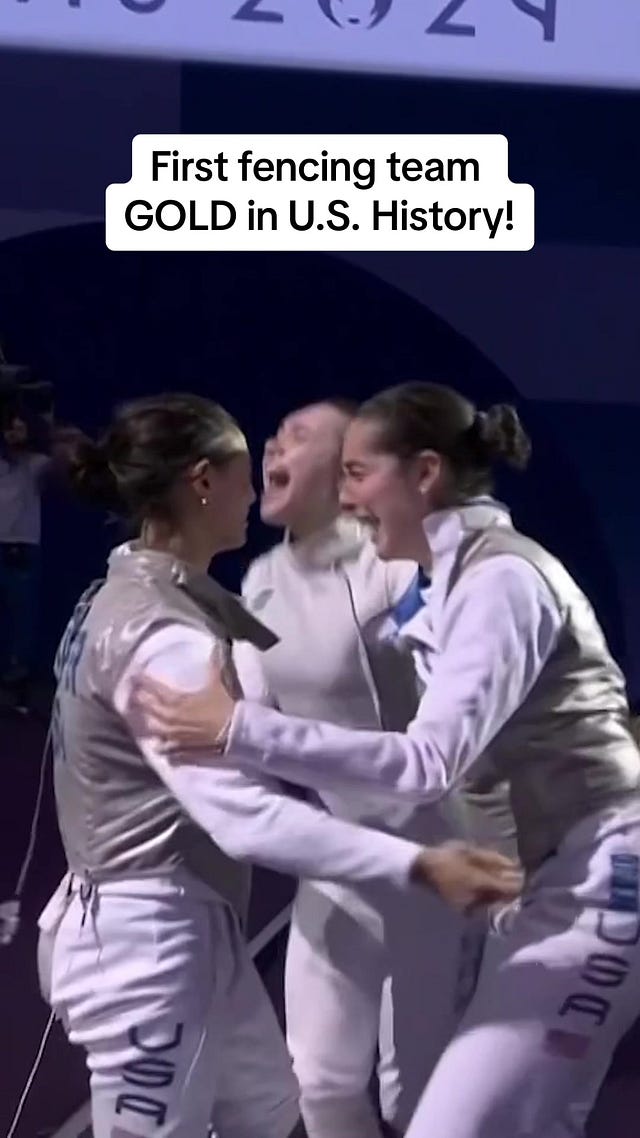Rings Roundup, Day 6: Watch Simone Soar
The all-around gymnastics final rocked. Plus, the entire world is listening to the widely discredited president of one of the most corrupt international sporting organizations ever, for some reason
Thursday was the day Team USA got its ass off the mat at the Olympics and started winning gold medals. Through five days, Team USA only had five gold medals. Sure, more than most UN member states have won in their entire Olympic histories, but well behind our pace from most games—Team USA had 11 golds through five days in 2016 and 2020 and 12 in 2012.
On Thursday alone, we won four—some in expected, some of its expected events (like Simone Biles winning the individual All-Around, continuing her 11-year long undefeated streak in all-around events, and some unexpected, like the men’s four rowing, which Team USA hadn’t won since 1960. Look at our boys in the boat!
Anyway, let’s give out some rings. I’m sorry I said I’d deliver these at 7:30 a.m. every day—that’s simply not happening. I kinda hit a wall today, which is why this entry is short and delayed. But I’m trying my best, and I hope you’re enjoying them.
Six Rings: Simone Biles
I want to bottle the tension of the women’s all-around gymnastics final. After three rotations, Simone Biles, Suni Lee, and Brazil’s Rebeca Andrade were all relatively close in the standings, with Biles leading Andrade by just .166 points.
Lee went first. Perfect. Andrade went next. Even better.
And then went Simone Biles, and, well… you know what happened. She was Simone Biles.
The win made Biles the first two-time all-around champion since the 1960s. She still hasn’t lost an all-around competition since 2013, when she was 16 years old.
When Team USA won the team all-around on Tuesday, it wasn’t particularly close at any point, and Biles didn’t really need to push herself, knowing that safe routines were more important. In the end, all-around final, Andrade pushed Biles hard enough that we all had to watch when Biles did the breathtaking first pass of her floor routine, where she soars high enough to dunk a basketball with her head and sticks the landing with a smile. Which is good. Everybody should watch Simone Biles’ floor routine, multiple times per day if possible.
The sport of gymnastics has changed for the better over the course of Biles’ career. Gymnastics used to be a sport of girls who were ground into dust over the course of brief careers and retired in their teens. Now it’s a sport of women who grow, become stronger, and perform more difficult routines into their 20’s. At 27, Biles is the oldest all-around champion since 1952—and the first one over 20 in over 50 years. The American gold medal-winning all-around team is the oldest ever. Biles is also one of many who spoke out against the sexual abuse within USA Gymnastics which surely discouraged so many talented women from continuing in the sport.
Biles’ win in the all-around is yet another sign of her GOAT status. She now has six Olympic golds to go with her 23 world championships. She’s even better now than she was in 2016, performing more difficult routines and thriving. But her greatness wouldn’t be as incredible if gymnastics hadn’t grown with her.
Three Rings: Foil Dominance
Gonna be honest: I’ve watched and written way more fencing stuff than I had previously anticipated. Generally, it has been because the fencing seems to always come down to the final few points, often heading into overtime, when the winner is decided by a single point. Fencing should be sudden death—it’s kinda the point of swords.
But Lee Kiefer and the USA foil team didn’t let it get exciting. After Kiefer and Lauren Scruggs went gold-silver in the individual competition, they were the obvious favorites with the two best fencers in a three-person event. They delivered. They beat China 45-37, then Canada 45-31, then Italy 45-39. Outside of a brief early deficit against Canada, their gold medal was never really in doubt.
Team USA didn’t win a gold medal in fencing between 1904 (again, in an event called “singlesticks” in which no other countries entered competitors) and 2004. That changed with Mariel Zagunis’ back-to-back individual titles in women’s sabre. But Team USA never had a roster deep enough to win a team event. Kiefer and Co. pulled it off, and it wasn’t even particularly close. And with the men’s foil event still to come, Team USA has a legit shot at being the country with the most fencing golds in Paris.
En garde, losers—we’re a fencing country now.
Two Rings: The Ivy League
Thursday, the Ivies finally did something for the rest of us. Our gold-winning fencing team was 3/4ths Ivy-produced, with Harvard’s Lauren Scruggs, Columbia’s Jacquelin Dubrovich, and Princeton’s Maia Weintraub. The slacker, double gold-winner Lee Kiefer, only went to Notre Dame and is getting a medical degree now.
And then there was the surprisingly dominant gold by the men’s fours rowing team, a wire-to-wire W in the sport most clearly dominated by people who go to snooty colleges. The team featured Cornell’s Michael Grady, Princeton’s Nick Mead, and Harvard’s Liam Corrigan. Corrigan went on to get a master’s at Oxford, which is the rowing equivalent of going to the pros after college. The fourth team member, Justin Best, went to Drexel—but he says he was inspired to get into rowing after watching the Winklevoss twins rowing at Harvard in The Social Network, so, count it.
I’m sure you’ll get into the medal count too, Brown and Dartmouth! You’re real Ivies just like the other six! They definitely don’t make fun of you or anything!
laurie hernandez
Negative 1,000 Rings: Talking About Whether This Woman Is A Woman
If you talk about basically any women’s sports event online, people will start yelling at you about their belief that trans female athletes are dominating women’s sports. This is, notably, not happening, which you would know if you watch women’s sporting events. It’s especially not happening in 2024, after all sorts of American and international sporting organizations have responded to critics by passing rules to prevent trans women from participating in women’s sports.
Having broadly gotten their wishes, transphobes have turned to complaining about women like Algerian boxer Imane Khelif, the silver medalist from the 2022 world championships, who became the center of an international firestorm after Italian boxer Angela Carini quit seconds into the opening round of their fight. This was the only Olympic thing people seemed to be talking about yesterday.
The situation here is pretty clear-cut: Khelif is a woman. She was born and raised as a woman and competed in international competitions for years with no controversy. She comes from Algeria, a country with restrictive LGBT rights where people are not allowed to transition. It’s possible she was born with an intersex condition, like 2-time Olympic gold medalist Caster Semenya. But even under the restrictive rules that have been passed by organizations like US Boxing and in conservative states across the USA, women like Khelif would typically be sorted into women’s sporting events.
I think what’s been overlooked is primary spark of the controversy, which seemingly had less to do with Khelif and more to do with political rifts within the shady, corrupt world of international sports. (And I love writing political rifts within the shady, corrupt world of international sports.) This really has to do with the International Boxing Association, an organization which stands out as untrustworthy and corrupt, even in the untrustworthy and corrupt world of international sports—and everybody is buying into their BS.
Khelif was competing at the 2023 World Championships when the IBA suddenly disqualified her ahead of the gold medal match. Until this point, Khelif had never failed any gender or doping test. The IBA says they determined Khelif has a Y chromosome, citing testing results which they never released. In fact, they still haven’t even said what type of testing they used. The decision to ban Khelif seems to have come directly from IBA president Umar Kremlev, according to the IBA’s official minutes. Later in the same meeting, it is agreed that the IBA should establish a protocol for gender testing—after they’d already banned Khelif over the gender testing Kremlev says they did.
When the Khelif decision was made, the IBA was in deep trouble. The IBA always had issues with corruption and general poor governance, including a match-fixing scandal at the 2016 Olympics which was directly overseen by the IBA. But under the leadership of Kremlev, a friend of Vladimir Putin’s, the IBA has committed totally to taking Putin’s side in his various disputes with the IOC, which had banned Russian athletes from events due to Russia’s state-sponsored doping program and their invasion of Ukraine. Many countries, including the United States, boycotted the 2023 IBA world championship in which Khelif was disqualified due to a number of concerns about whether the IBA was actually holding a legitimate tournament. A month later, the IOC removed the IBA’s recognition, citing governance, finance, and ethical issues—the first time the IOC had ever fully cut ties with an international sports federation.
The IOC made a special exception to hold boxing at the 2024 Olympics without the governance of an international federation. But unless the boxing world can unite behind a new international federation, the sport won’t be included in the 2028 Olympics and future games. And now, the boxing world is yelling at each other about whether this woman is a woman when they need to come up with a way to keep boxing in the Olympics. That’s just fine with Kremlev, who has been releasing videos calling the Olympics “sodomy” and telling boxers to compete in Putin’s World Friendship Games instead.
Kremlev’s gambit has worked. People are treating the removal of Khelif from the 2023 championships as the legitimate decision of a reputable international sports organization, when in reality, it was made by a discredited organization clearly interested in sowing discord in the international sports world.
The people who sparked this controversy have an obvious interest in dragging down Olympic boxing. And if they get their way and keep boxing from being an Olympic sport going forward, they’ll ruin the Olympic dreams of far more women than any single competitor ever could.









Thank you for this well-organized, well-sourced analysis of the Imane Khelif story, Rodger.
Thanks for informing me about Imane Khelif!